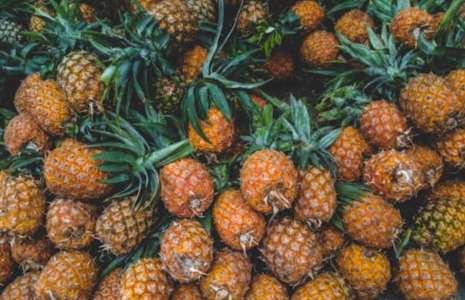Are you missing out? See why everyone's ditching pineapples and what you should eat instead
By
Gian T
- Replies 2
In the land down under, where the sun shines bright and the beaches beckon, there's a surprising trend that's leaving some of our farmers scratching their heads. Despite Australia's love for fresh, juicy fruits, it seems that the humble pineapple is being left behind on supermarket shelves. But why are Aussies turning their backs on this tropical treat, and what alternatives are they reaching for instead?
The Pineapple Predicament: Convenience vs. Tradition
Australia's pineapple industry, with its heart in places like Yeppoon in central Queensland and Beerwah in southern Queensland, has been a proud part of our agricultural landscape for decades. Tropical Pines, the country's largest fresh pineapple supplier, packs over 10 million fruits annually. Yet, even with our population growing, pineapple sales have hit a plateau.
The reason? It appears that the modern Australian shopper is seeking convenience above all else. The time and effort it takes to slice, dice, and deal with the aftermath of preparing a pineapple are turning consumers towards easier options. This shift towards convenience is not just a quirky preference; it's a reflection of our increasingly hectic lifestyles, where every minute counts and ease of use is king.
The Cost of Convenience: Health and Economy at Stake
This trend towards convenience is not just a problem for pineapple farmers; it has broader implications for the health of our population and the economy. As we opt for pre-cut veggies and ready-made meals, our consumption of fresh produce is dwindling. AUSVEG, the peak body for the vegetable, potato, and onion industries, reports that a staggering 93 per cent of Australians don't eat enough veggies, averaging only 1.8 serves a day compared to the recommended five.
The misconception that fresh produce is too expensive in today's high cost-of-living conditions is also contributing to this decline. Yet, the reality is that a serving of vegetables costs around 65 cents for about 75 grams, making it more affordable than many popular snack foods.
Innovating for the Future: New Packaging and Social Media Savvy
So, what's next for the pineapple industry and other 'inconvenient' fruits? The key lies in innovation and marketing. Growers and industry bodies are exploring new ways to package these fruits to make them more appealing to the time-poor consumer. Social media platforms like TikTok, Instagram, and YouTube are becoming valuable tools for educating younger customers about the joys of fresh fruit and how to prepare it quickly and easily.
Some industries are even looking into value-adding processes like juicing and freeze-drying to boost sales. By connecting with younger audiences through authentic social commerce, farmers hope to reignite the love for fresh produce.
The Alternatives: What Are Aussies Eating Instead?
As pineapples face a tough crowd, what are the alternatives that Australians are turning to? Convenience-driven options like pre-sliced apples, snack-sized carrot sticks, and easy-peel citrus fruits are on the rise. Berries, too, are gaining popularity due to their ready-to-eat nature and perceived health benefits.
But before you ditch the pineapple altogether, consider this: pineapples are packed with nutrients, including vitamin C, manganese, and bromelain, an enzyme with anti-inflammatory properties. They're also incredibly versatile, perfect for sweet and savoury dishes alike.
The Bottom Line: Don't Miss Out on Pineapple Perks
While the convenience factor is undeniable, we shouldn't let it dictate our diets entirely. There's a certain joy in preparing and enjoying fresh food, and the health benefits are worth the extra effort. So next time you're at the supermarket, why not give pineapples another chance? You might just rediscover the sweet satisfaction of this tropical delight.

And remember, by choosing to eat fresh produce like pineapples, you're not only nourishing your body but also supporting Australian farmers and contributing to the health of our economy. So, let's not say goodbye to pineapples just yet. Instead, let's find new ways to enjoy them and keep this juicy gem on our plates and in our hearts.
The Pineapple Predicament: Convenience vs. Tradition
Australia's pineapple industry, with its heart in places like Yeppoon in central Queensland and Beerwah in southern Queensland, has been a proud part of our agricultural landscape for decades. Tropical Pines, the country's largest fresh pineapple supplier, packs over 10 million fruits annually. Yet, even with our population growing, pineapple sales have hit a plateau.
The reason? It appears that the modern Australian shopper is seeking convenience above all else. The time and effort it takes to slice, dice, and deal with the aftermath of preparing a pineapple are turning consumers towards easier options. This shift towards convenience is not just a quirky preference; it's a reflection of our increasingly hectic lifestyles, where every minute counts and ease of use is king.
The Cost of Convenience: Health and Economy at Stake
This trend towards convenience is not just a problem for pineapple farmers; it has broader implications for the health of our population and the economy. As we opt for pre-cut veggies and ready-made meals, our consumption of fresh produce is dwindling. AUSVEG, the peak body for the vegetable, potato, and onion industries, reports that a staggering 93 per cent of Australians don't eat enough veggies, averaging only 1.8 serves a day compared to the recommended five.
The misconception that fresh produce is too expensive in today's high cost-of-living conditions is also contributing to this decline. Yet, the reality is that a serving of vegetables costs around 65 cents for about 75 grams, making it more affordable than many popular snack foods.
Innovating for the Future: New Packaging and Social Media Savvy
So, what's next for the pineapple industry and other 'inconvenient' fruits? The key lies in innovation and marketing. Growers and industry bodies are exploring new ways to package these fruits to make them more appealing to the time-poor consumer. Social media platforms like TikTok, Instagram, and YouTube are becoming valuable tools for educating younger customers about the joys of fresh fruit and how to prepare it quickly and easily.
Some industries are even looking into value-adding processes like juicing and freeze-drying to boost sales. By connecting with younger audiences through authentic social commerce, farmers hope to reignite the love for fresh produce.
The Alternatives: What Are Aussies Eating Instead?
As pineapples face a tough crowd, what are the alternatives that Australians are turning to? Convenience-driven options like pre-sliced apples, snack-sized carrot sticks, and easy-peel citrus fruits are on the rise. Berries, too, are gaining popularity due to their ready-to-eat nature and perceived health benefits.
But before you ditch the pineapple altogether, consider this: pineapples are packed with nutrients, including vitamin C, manganese, and bromelain, an enzyme with anti-inflammatory properties. They're also incredibly versatile, perfect for sweet and savoury dishes alike.
The Bottom Line: Don't Miss Out on Pineapple Perks
While the convenience factor is undeniable, we shouldn't let it dictate our diets entirely. There's a certain joy in preparing and enjoying fresh food, and the health benefits are worth the extra effort. So next time you're at the supermarket, why not give pineapples another chance? You might just rediscover the sweet satisfaction of this tropical delight.
Key Takeaways
- Australia's pineapple industry is facing stagnant sales despite population growth due to consumers finding the fruit inconvenient to prepare and eat.
- Retail experts suggest that convenience is a major driving factor in consumer behaviour, impacting sales of fruits perceived as requiring too much effort to consume.
- New marketing strategies, including the use of social media and innovative packaging, are being considered to attract younger customers and boost the consumption of pineapples.
- The broader trend of declining fruit and vegetable consumption is raising concerns for consumer health and the economy, prompting industry and health officials to encourage increased intake.








